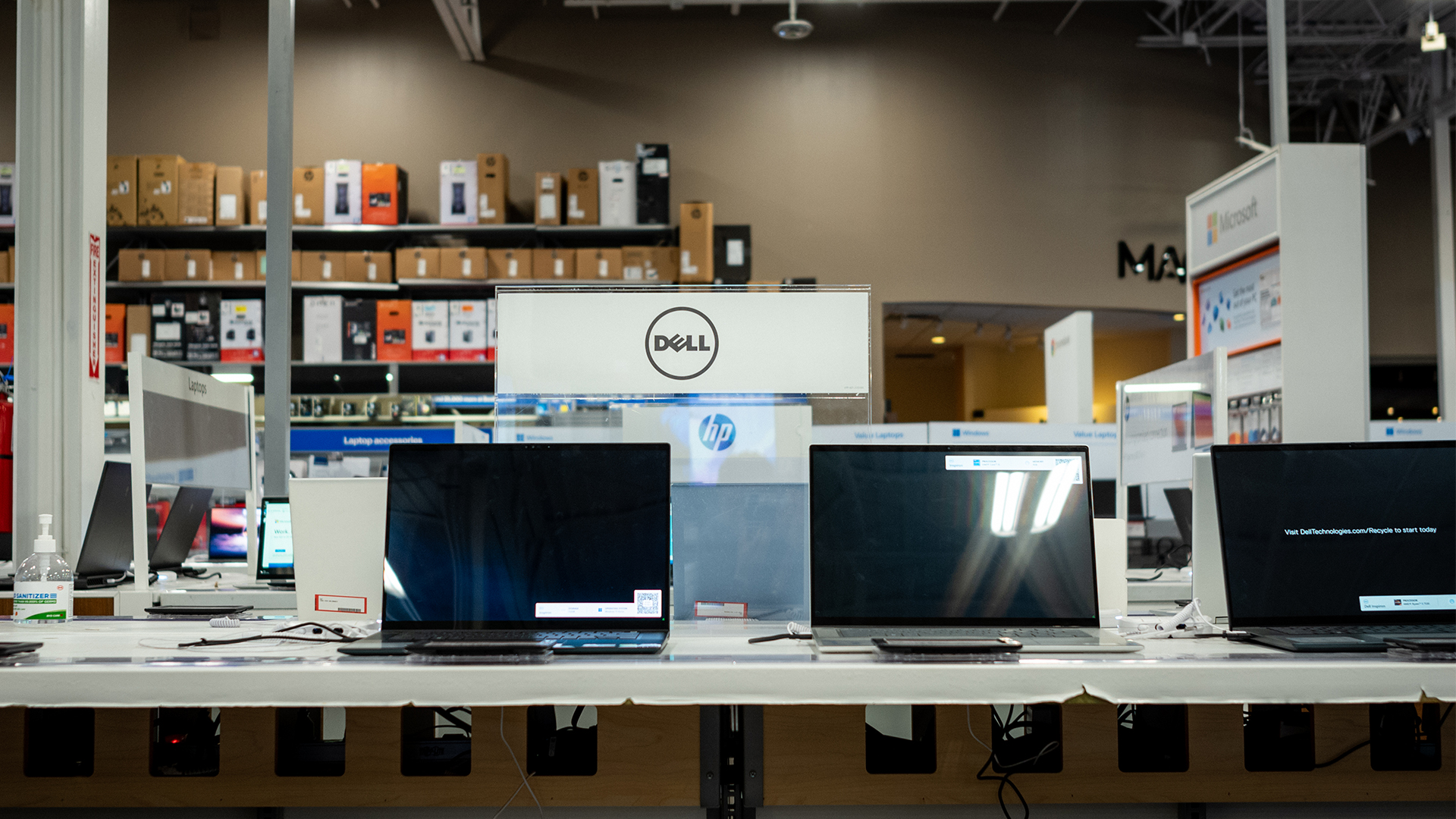‘A huge national security risk’: Thousands of government laptops, tablets, and phones are missing and nowhere to be found
Over 2,000 devices have been lost or stolen across 18 Whitehall departments over the last two years


Sign up today and you will receive a free copy of our Future Focus 2025 report - the leading guidance on AI, cybersecurity and other IT challenges as per 700+ senior executives
You are now subscribed
Your newsletter sign-up was successful
The UK government has lost over 2,000 laptops, phones, and tablets within the last two years, according to a freedom of information disclosure.
Figures first published by The Guardian show that, combined, the lost devices are worth more than £1 million, but experts told ITPro that the real issue is the cybersecurity risk they pose.
Devices reported as either lost or stolen from the Department for Work and Pensions totaled 240 missing laptops and 124 missing phones in 2024.
The Ministry of Defence recorded 103 missing laptops and 387 missing phones, while the Cabinet Office is said to have lost or had stolen 66 laptops and 124 phones.
Missing devices were recorded across 18 Whitehall departments and public authorities in the last year, which included the Bank of England, HM Treasury, and the Home Office.
The Bank of England told The Guardian that it “takes the security of devices and data very seriously and has suitable protection in place”.
ITPro has approached the UK government for comment, but in a statement given to the publication, said: “We take the security of government devices extremely seriously, which is why items such as laptops and mobile phones are always encrypted so any loss does not compromise security.”
Sign up today and you will receive a free copy of our Future Focus 2025 report - the leading guidance on AI, cybersecurity and other IT challenges as per 700+ senior executives
Lost government devices are a security nightmare
While the financial cost of this loss is substantial, the greater concern is the cybersecurity risk presented by the loss or theft of these devices, according to James Castro-Edwards, counsel for multinational law firm Arnold & Porter
“Sophisticated hackers can break into such devices, potentially opening a ‘back door’ to government departments,” Castro-Edwards told ITPro. “This is particularly concerning when hackers are not only organized criminal gangs, but hostile nation states.
“Where the affected government department handles sensitive information, for instance, the Ministry of Defence or the security services, this creates a huge national security risk.”
Castro-Edwards said it’s crucial that all organizations implement “rigorous technical security measures” such as encryption and strong password protection to ensure devices remain secure.
Stolen devices play a crucial role in the cyber criminal economy, according to Boris Cipot at cybersecurity firm, Black Duck, underlining the dangers posed by lost government hardware.
"Stolen hardware is often ‘refurbished’ and then sold as used devices,” he explained. “This is because modern encryption software on these devices makes it difficult to access the data stored on hard drives or other storage media.”
“However, even the most advanced encryption is ineffective if the encryption key or user password is weak,” Cipot added.
With this in mind, Cipot said organizations should not solely rely on the “technical capabilities of protection software”. Passwords used to access and disable encryption must be robust.
“For government-issued laptops and phones, it is particularly recommended to implement MFA,” he said. “MFA can take the form of digital methods, such as biometric verification, or physical methods, such as a USB key or ID card.”
“This additional layer of security significantly enhances the protection of sensitive data and reduces the risk of unauthorized access, further ensuring uncompromised trust in software."
MORE FROM ITPRO
- Cyber attacks have rocked UK retailers – here's how you can stay safe
- What good laptop security looks like today
- The NCSC wants developers to get serious on software security
Bobby Hellard is ITPro's Reviews Editor and has worked on CloudPro and ChannelPro since 2018. In his time at ITPro, Bobby has covered stories for all the major technology companies, such as Apple, Microsoft, Amazon and Facebook, and regularly attends industry-leading events such as AWS Re:Invent and Google Cloud Next.
Bobby mainly covers hardware reviews, but you will also recognize him as the face of many of our video reviews of laptops and smartphones.
-
 How the rise of the AI ‘agent boss’ is reshaping accountability in IT
How the rise of the AI ‘agent boss’ is reshaping accountability in ITIn-depth As IT companies deploy more autonomous AI tools and agents, the task of managing them is becoming more concentrated and throwing role responsibilities into doubt
-
 Hackers are pouncing on enterprise weak spots as AI expands attack surfaces
Hackers are pouncing on enterprise weak spots as AI expands attack surfacesNews Potent new malware strains, faster attack times, and the rise of shadow AI are causing havoc
-
 ‘Hugely significant’: Experts welcome UK government plans to back down in Apple encryption battle – but it’s not quite over yet
‘Hugely significant’: Experts welcome UK government plans to back down in Apple encryption battle – but it’s not quite over yetNews Tulsi Gabbard, US director of national intelligence, has confirmed the UK plans to back down on plans that would see Apple forced to create a "back door" for authorities.
-
 Millions of Dell laptops are are at risk thanks to a Broadcom chip vulnerability – and more than 100 device models are impacted
Millions of Dell laptops are are at risk thanks to a Broadcom chip vulnerability – and more than 100 device models are impactedNews Widely used in high-security environments, the PCs are vulnerable to attacks allowing the theft of sensitive data
-
 The UK cybersecurity sector is worth over £13 billion, but experts say there’s huge untapped potential if it can overcome these hurdles
The UK cybersecurity sector is worth over £13 billion, but experts say there’s huge untapped potential if it can overcome these hurdlesAnalysis A new report released by the DSIT revealed the UK’s cybersecurity sector generated £13.2 billion over the last year
-
 "Thinly spread": Questions raised over UK government’s latest cyber funding scheme
"Thinly spread": Questions raised over UK government’s latest cyber funding schemeThe funding will go towards bolstering cyber skills, though some industry experts have questioned the size of the price tag
-
 Threat of cyber attacks to national security compared to that of chemical weapons
Threat of cyber attacks to national security compared to that of chemical weaponsNews The UK government has raised the threat level posed by cyber attacks, deeming it greater on average than an event such as the Salisbury poisoning
-
 Iranian hackers targeted nuclear expert, ported Windows infection chain to Mac in a week
Iranian hackers targeted nuclear expert, ported Windows infection chain to Mac in a weekNews Fresh research demonstrates the sophistication and capability of state-sponsored threat actors to compromise diverse targets
-
 2022 Public Sector Identity Index Report
2022 Public Sector Identity Index ReportWhitepaper UK Report
-
 The top malware and ransomware threats for April 2023
The top malware and ransomware threats for April 2023News New ransomware gangs and malware abound as hackers continue to evolve their tactics
